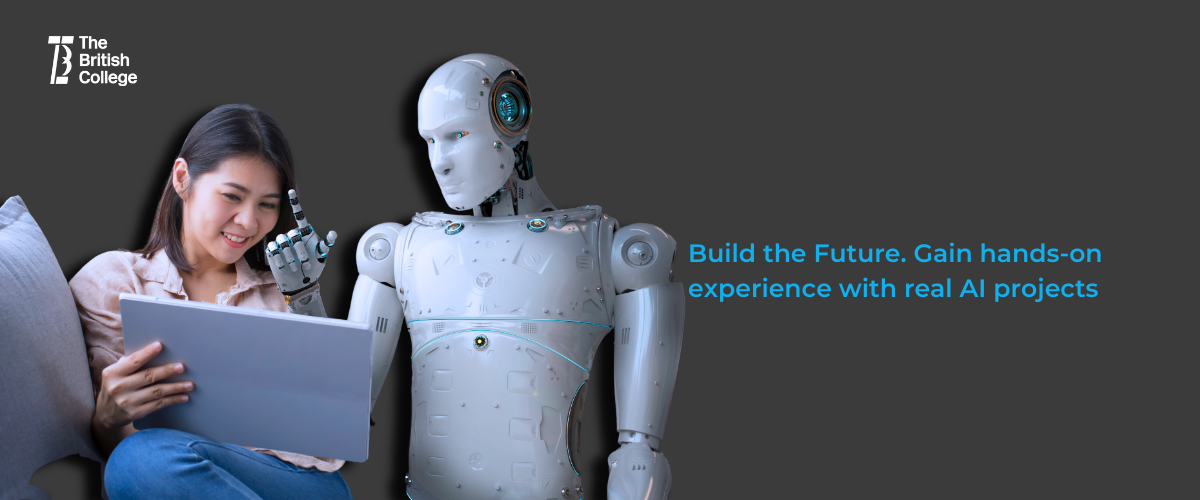Complete Guide to AI Course in Nepal 2025

Nepal's tech revolution is underway, and artificial intelligence is leading the charge. The global demand for AI professionals continues to rise, with PwC's 2025 Global AI Jobs Barometer revealing that AI skills command a 56% wage premium. This makes an AI course in Nepal one of the smartest educational investments you can make today.
Whether you're a recent +2 graduate or looking to shift your career, Nepal's growing AI sector offers exceptional opportunities. From Kathmandu's bustling tech hubs to emerging startups nationwide, AI professionals are shaping our digital future.
What is Artificial Intelligence and Why Study It?
Artificial Intelligence (AI) is the technology that enables machines to think, learn, and make decisions like humans. Think of it as teaching computers to recognise patterns, solve problems, and adapt to new situations. When you ask Siri a question or Netflix suggests a film you will love, that's AI working behind the scenes.
Nepal's AI landscape is already transforming daily life:
- eSewa uses AI to detect fraudulent transactions
- Ncell operates customer service bots answering queries 24/7
- A Biratnagar startup built an app warning farmers about pests using drone imagery
- A startup in Biratnagar built an app that warns farmers about pests using drone images.
The Digital Nepal Framework recognises AI as a priority sector for economic development. Government initiatives allocate substantial resources towards building AI infrastructure and training programmes, creating numerous career opportunities for qualified professionals.
Core Areas of AI You Will Master
Modern AI education encompasses interconnected disciplines that work together to create intelligent systems. You will explore the fundamentals enabling intelligent systems to learn, understand, and interact with our world.
- Machine Learning Fundamentals
You will create algorithms enabling computers to learn from data. This proves crucial in finance, where predictive models forecast stock trends and assess credit risks.
- Deep Learning Applications
This involves building complex neural networks that mimic the human brain. Deep learning powers technologies like facial recognition used in security systems and smartphones.
- Natural Language Processing (NLP)
NLP enables computers to understand and respond to human language. It is the technology behind voice assistants and automated customer support in Nepalese banks and companies. - Computer Vision & Robotics
These teach machines to interpret visual information and perform tasks autonomously. Robotics is advancing in Nepal’s manufacturing and logistics sectors.
- AI Ethics and Responsible Development
You will study how to build AI responsibly, respecting privacy and avoiding bias. In Nepal’s diverse society, ethical AI is essential to ensure fair and inclusive technology.
How AI is Transforming Industries in Nepal
AI actively reshapes sectors across Nepal, creating new efficiencies and opportunities:
- Banking:
AI-driven fraud detection systems secure financial transactions. Chatbots improve customer service by handling routine queries instantly. - Healthcare:
AI analyses medical images, helping doctors with early disease detection. It streamlines administrative tasks, freeing staff to focus on patient care. - Agriculture: AI helps Nepalese farmers predict harvest products and monitor soil health, leading to sustainable farming practices and improved harvests.
- Tourism:
Personalised travel recommendations and smart tour guides enhance visitor experiences, making trips more enjoyable and seamless. - E-commerce:
AI algorithms analyse consumer behaviour, providing tailored product recommendations that boost sales and customer satisfaction.
Why Choose an AI Course in Nepal?
Nepal's tech sector grows rapidly, driven by government initiatives like the Digital Nepal Framework. The demand for AI professionals soars as local startups and global firms seek talent.
Choosing an AI course in Nepal proves cost-effective compared to studying abroad, yet offers world-class education through programmes like the BSc Hons Computer Science syllabus focused on AI. You will access internships with local tech firms and earn international certifications, boosting your employability significantly.

Nepal's AI Industry Growth Statistics
Recent data reveals remarkable growth across multiple indicators:
- 280% growth in AI-related job postings (2022-2024) - Nepal Software and IT Association
- NPR 1.2 billion venture capital investment in AI startups (2024), up from NPR 180 million (2022)
- 5% annual ICT employment growth, with the government targeting 500,000 direct IT jobs (New Business Age)
- USD 515 million in tech exports, supported by 350+ startups (2023) (World Bank)
- NPR 50,000–200,000/month salaries for AI professionals, depending on experience (necojobs.com.np)
These numbers demonstrate clear momentum and bright prospects for AI learners.
Top AI Courses Available in Nepal
When considering an AI course in Nepal, understanding available options proves essential. Many institutions offer international affiliation, providing globally recognised qualifications.
Bachelor's Degree Programmes
Nepal's institutions offer various undergraduate programmes, including B.Tech in AI, BSc computer science course options, and specialised AI degrees. However, the BSc Hons Computer Science syllabus remains one of Nepal's premier AI programmes.
The British College - University of the West of England Partnership
The British College delivers Nepal's most comprehensive AI education through its partnership with the University of the West of England (UWE), Bristol. This collaboration ensures students receive a British-standard education whilst studying in Kathmandu.
The programme combines UWE's academic rigour with an understanding of Nepal's market needs. Students earn globally recognised degrees, opening opportunities for further studies at top universities or employment with multinational corporations.
Laboratory facilities feature cutting-edge equipment, including GPU clusters for deep learning, robotics labs, and collaborative spaces for project-based learning. The college maintains partnerships with tech companies for internships and graduate recruitment.
Details Syllabus of BSc (Hons) AI Course in Nepal
The BSc Hons Computer Science syllabus follows a progressive structure, building from foundational concepts to advanced AI specialisations. This systematic approach ensures students develop robust technical skills whilst maintaining broad computer science knowledge.
Level 3 / Year 0: Foundation Programme
Semester 1:
- Academic English & Effective Communication (15 credits)
- Mathematics for Computing (15 credits)
- Introduction to Programming (15 credits)
- Computer Fundamentals and Networks (15 credits)
Semester 2:
- Advanced Academic Communication (15 credits)
- Internet Technologies (15 credits)
- Fundamentals of Multimedia (15 credits)
- Fundamentals of Data Science (15 credits)
To explore more information on other semester models, → Click Here
Eligibility Requirements for AI Courses in Nepal
Understanding admission requirements helps students prepare effectively. Requirements maintain consistent academic standards across Nepal's top colleges.
Foundation Programme Eligibility:
- Completed +2 or equivalent with a minimum 60% aggregate (GPA 2.4)
- Strong mathematics and science background preferred
- English proficiency demonstrated through +2 results
Direct Entry Requirements:
- +2 with a minimum 75% aggregate and 70% in English, OR
- A-levels with 120 UCAS points from three subjects
- IELTS 6.0 overall with no skill below 5.5
BSc Hons Computer Science Eligibility Considerations
Additional programmes may require entrance examinations testing logical reasoning, mathematics, and English comprehension. Interview processes assess motivation, career goals, and understanding of AI applications.

Admission Process Step-by-Step Guide
Step 1: Application Submission
Complete online application forms with academic transcripts, personal statements, and supporting documents. Most colleges accept applications year-round, though popular programmes may have specific deadlines.
Step 2: Entrance Examination
Sit for college-specific entrance tests covering mathematics, logical reasoning, and English. Preparation typically requires 2-3 months of focused study on quantitative aptitude and basic programming concepts.
Step 3: Document Verification
Submit original academic certificates, citizenship documents, and character certificates for verification. International students may require additional documentation, including passport copies and visa applications.
Step 4: Interview Process
Participate in an admission interview, assessing technical aptitude, communication skills, and career motivation. Interviews typically last 10-20 minutes and may include basic technical questions.
Step 5: Fee Payment
Complete fee payment procedure, including registration fees, first semester tuition, and any additional charges. Most colleges offer instalment payment options to ease financial burden.
Career Opportunities After the AI Course in Nepal
AI graduates enjoy diverse career paths with excellent growth prospects both domestically and internationally. The expanding job market offers opportunities across industries, salary levels, and professional development tracks.
High-Demand AI Job Roles in Nepal
- AI/ML Engineer:
Design and implement machine learning solutions for business problems. Responsibilities include data preprocessing, model development, and deployment of AI systems. Companies like F1Soft, Leapfrog Technology, and CloudFactory actively recruit these professionals. - Data Scientist:
Analyse complex datasets to extract business insights using advanced statistical methods and programming languages like Python and TensorFlow. Banks, insurance companies, and e-commerce platforms offer opportunities across Nepal. - AI Research Associate:
Research cutting-edge technologies in deep learning and neural networks, publishing findings in academic journals. Positions are available at universities and private R&D departments. - AI Product Manager:
Bridge technical teams and business stakeholders to develop AI-powered products using cognitive computing principles and algorithm development expertise.
International Career Opportunities in AI
- Gulf Countries:
UAE and Qatar recruit AI professionals for smart city initiatives and digital transformation projects, offering tax-free earnings and career advancement. - Australia:
The tech sector offers permanent residency pathways through graduate visa programmes, particularly welcoming professionals with machine learning and data analytics expertise. - Canada:
Express Entry programmes prioritise AI professionals for immigration, with Provincial Nominee Programs targeting technology education graduates. - European Markets:
Germany, the Netherlands, and the UK offer opportunities within digital transformation initiatives, with competitive salaries and permanent residency pathways.
Starting Your Own AI Business in Nepal
Government Support:
Nepal's Startup Act 2021 provides tax incentives, regulatory support, and funding opportunities for technology startups. AI companies receive additional benefits under Digital Nepal initiatives, including access to government contracts and international market facilitation.
Funding Options:
Venture capital firms like Business Oxygen, Dolma Impact Fund, and CG Ventures actively invest in AI startups. Additionally, government programmes offer seed funding up to NPR 2 million for qualifying technology ventures.
Success Stories:
Companies like IntroCept, Kharpat, and Tootle demonstrate AI entrepreneurship potential in Nepal. These startups leverage local talent to serve both domestic and international markets, creating employment whilst building valuable intellectual property.
Market Opportunities:
Sectors like agriculture, tourism, and healthcare offer significant opportunities for AI innovation. Furthermore, Nepal's position as a bridge between Indian and Chinese markets creates unique opportunities for AI service exports.

How to Choose the Right AI Course for You?
Selecting an AI programme requires careful evaluation of multiple factors affecting your career trajectory and learning experience.
- Career Goals Alignment:
Consider whether you prefer research-oriented careers in cognitive computing, product development roles in software development, or entrepreneurship paths in STEM careers. - Budget Considerations:
Compare total programme costs against expected returns, considering the salary premiums AI graduates command over general computer science graduates. - Accreditation Recognition:
International partnerships ensure global degree recognition. The British College's UWE partnership exemplifies this advantage for technology education. - Faculty Expertise:
Research faculty backgrounds in innovation, industry experience, and publication records in areas like big data analytics and automation.
Red Flags to Avoid When Selecting AI Programmes
Below are some of the four red flags to avoid when selecting an AI course in Nepal:
- Non-Accredited Institutions: Verify programme accreditation through official government databases. Degrees from unrecognised institutions may not transfer to other programmes or gain employer acceptance. Additionally, non-accredited programmes cannot participate in government scholarship schemes.
- Inadequate Infrastructure: Programmes lacking modern computing facilities, reliable internet connectivity, or software access cannot deliver a quality AI course in Nepal. Visit facilities and ask about hardware specifications, cloud computing access, and software licensing arrangements.
- Inexperienced Faculty: Programmes staffed primarily by fresh graduates or faculty without industry experience may lack practical insights crucial for career preparation. Verify faculty qualifications, research backgrounds, and industry connections.
- Outdated Curriculum: AI technologies evolve rapidly, requiring a current curriculum that reflects industry standards. Programmes focusing solely on theoretical concepts without practical applications may leave graduates unprepared for workplace demands.
Future of AI Education in Nepal
The field of AI is always evolving, and so is the education that supports it. Upcoming trends in AI course in Nepal include a greater focus on specialised master's programmes, more industry partnerships, and a strong emphasis on research and development.

Upcoming Trends in AI Education
- Specialised Master's Programmes:
Expect more postgraduate courses in Machine Learning, Data Science, and Robotics, reflecting industry demand for advanced expertise. - Industry 4.0 Integration:
Educational programmes increasingly integrate smart systems concepts, preparing students for intelligent manufacturing and business environments. - Government Support:
The Digital Nepal Framework (DNF) and STEM education promotion create supportive ecosystems for aspiring AI professionals, with substantial funding for technology education initiatives.
Start Your Next Steps by Consulting with our counsellors
Taking the first step towards an AI career requires expert guidance and careful planning. Professional counsellors help navigate admission processes, career planning, and programme selection based on your circumstances and goals.
Ready to transform your career and join Nepal's digital future? The application period for the 2025 intake is now open. Don't miss your chance to secure a place in a programme that can unlock your full potential in artificial intelligence and related fields.
For more information, to book a counselling session, or to apply, visit The British College website today. Our admissions team is ready to guide you through your next steps towards a rewarding career in AI.
Application Timeline for 2025 and Upcoming Intake
- January 2025:
Applications open for the September intake. Early applications receive priority consideration and scholarship opportunities.
- February-March 2025:
Application deadlines for international partnership programmes. Submit complete documentation, including transcripts and personal statements. - April 2025:
Entrance examinations are conducted for the BSc Hons Computer Science eligibility assessment. Prepare with mathematics, logical reasoning, and basic programming concepts.
- May 2025:
Personal interviews scheduled. Assessment includes technical aptitude, communication skills, and career motivation. - June 2025:
Final admission decisions announced. Successful candidates receive detailed orientation information and pre-course materials. - July-August 2025:
Fee payment deadlines and course registration. Complete documentation verification and secure accommodation if required. - September 2025:
The academic year commences with orientation programmes and foundation courses.
FAQs About the AI Course in Nepal
- Is prior programming experience necessary?
No, the BSc Computer Science course at The British College starts with basics like Introduction to Programming, perfect for beginners. - What are the career prospects in Nepal?
AI graduates are in demand, with roles like AI/ML engineer offering NPR 60,000–150,000/month in Kathmandu’s growing tech hub. - How does Nepal’s AI education compare internationally?
The British College’s UWE partnership ensures a UK-standard curriculum, comparable to top global programs but more affordable. - What is the job market like for AI graduates?
Nepal’s tech sector is growing 15% annually, with 200+ startups hiring AI talent. Global opportunities are also accessible. - Can I pursue higher studies abroad?
Yes, the UWE degree is recognised worldwide, enabling master’s studies in the UK, USA, or Australia. - Are part-time or evening AI courses available in Nepal?
While the BSc is full-time, short AI bootcamps in Kathmandu offer flexible schedules. Contact The British College for options. - What is the success rate of AI course graduates?
Over 85% of British College AI graduates secure jobs or further studies within six months, per internal surveys. - How to prepare for AI course entrance exams?
Focus on mathematics, basic computing, and English. Practice past papers and use online resources like Khan Academy.
Top 10 Questions to Ask Before Enrolling AI Course in Nepal
- Which companies recruit directly from the AI course in Nepal?
- Are international exchange or study abroad opportunities available?
- What research projects can undergraduate students participate in?
- How does the curriculum incorporate emerging AI technologies?
- What industry partnerships exist for internships and projects?
- What career support services continue after graduation?
- How are practical skills assessed beyond traditional examinations?
- Are there opportunities for students to publish research?
- How does the programme support entrepreneurship aspirations?
- What financial aid or scholarship opportunities exist?







